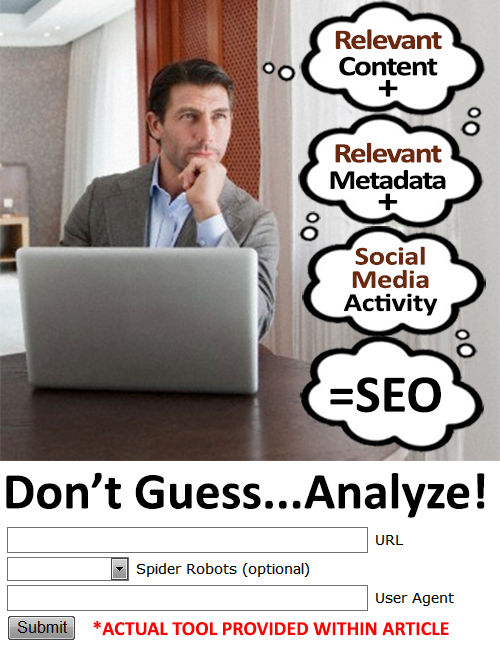Search Engine Optimization (5)
SEO is not a Destination, it is a State of Mind: Search Engine Optimization Coach
Written by Local Chicago Area Web Designer All business owners and entrepreneurs have the same goal: That is to be found on page #1 of Google Search Engine. That single objective requires most conventional businesses to travel along the same path. As a Creative Director based in the Chicago area, I have worked with countless clients over the years, these clients span countless industries. We work for old companies and start-ups, many of these clients even within the same industry, many of who are often even competitors.
All business owners and entrepreneurs have the same goal: That is to be found on page #1 of Google Search Engine. That single objective requires most conventional businesses to travel along the same path. As a Creative Director based in the Chicago area, I have worked with countless clients over the years, these clients span countless industries. We work for old companies and start-ups, many of these clients even within the same industry, many of who are often even competitors.
In any case, to become relevant in any industry or niche, the path these business owners must travel today, is not like the days of old. They are not buying advertisements in the yellow pages or in newspapers (do either of those even still exist). Client's seeking success in today's modern world of business are all looking to conquer search engines. CLICK HERE TO LEARN MORE
SEO: Don't Guess, Analyze! This Meta Tag Analyzing Tool Grades Relevancy!
Written by Sal Guccione Despite any modifications Google Search may implement in their search algorithms, depth of valuable content will always reign supreme. That being said, making sure your content is meta-tagged properly may be the single most important part of optimizing your website for search engines.
Despite any modifications Google Search may implement in their search algorithms, depth of valuable content will always reign supreme. That being said, making sure your content is meta-tagged properly may be the single most important part of optimizing your website for search engines.
I always tell my clients that search engines like Google, Yahoo and Bing are not going to put words in your mouth! In other words, if you are a "Plumber", then search engines will not assume that you provide "Hot Water Heater Repair Services" or "Sump Pump Repairs" unless there are "titled articles" along with text content, meta description and keywords which exist on your site communicating this.
This article demonstrates the basic fundamentals of Search Engine Optimization (SEO), specifically coding metadata such as meta descriptions and meta keywords into your websites content and articles. Additionally, this article provides a real working tool "the Meta Tag Analyzer", which will assist you in ensuring that your content and meta elements are accurate and in harmony with one another.
The words and phrases that you utilize in this "meta data" is not a guessing game. You can also use the "Meta Tag Analyzing Tool" to assist you in knowing exactly which phrases and keywords to use (specific to each article's content).
How to Get My Business on Google Maps and Google Places for Business?
Written by Karla Guccione, Web DesignerIs your Business located on Google Maps and Google Places for Business?
If not, it should be! Despite the simple fact that search engines such as Google and Yahoo have replaced the stone aged telephone books, both of these search engine titans also possess business listing services. Google has Google+ Places and Zagat, while Yahoo has Yelp. All which utilize map based business listings. These map based business listings assist consumers in finding business near their physical locations. This is even more relevant in today’s age of mobile devices, such as smart phones and tablets.
For instance, as a consumer is driving on the Kennedy Expressway in Chicago. A person in this vehicle is seeking a coffee shop nearby. They grab their iphone, open their web search and enter coffee shops. Their mobile device will provide map results, prior to providing web page results because the search engine has detected that they are mobile. Will your business show up if a smart phone or tablet user searches for your business type? If your business is not listed on Google Places for Business or Google+ Local then the answer is no!
SEO Secrets for Conquering Search Engines | Must Read for Website Owners
Written by Karla Guccione, Web DesignerBack in the day, consumers relied on newspapers and/or the yellow pages to gain information and/or to select a contractor or business. With the birth of the Internet, it is clear that most people now rely on their favorite search engine to assist them in researching and selecting their contractors or company to do business with. Many of us have become so accustomed to using search engines, that it is really hard to believe that search engines did not even exist until about 1990.
 Before getting into the nuts and bolts of what SEO is all about, it is important to understand the basic mechanics behind search engines. What is a search engine? A web search engine is designed to search for information on the World Wide Web, in which results are generally presented in a line of results often referred to as "search engine results pages (SERP's)". Unlike web directories, which are maintained only by human editors, search engines also maintain real-time information by running an algorithm on a web crawler. One of the first "all text" crawler-based search engines was Web Crawler, which came out in 1994. Unlike its predecessors, it let users search for any word in any web-page, which has become the standard for all major search engines since.
Before getting into the nuts and bolts of what SEO is all about, it is important to understand the basic mechanics behind search engines. What is a search engine? A web search engine is designed to search for information on the World Wide Web, in which results are generally presented in a line of results often referred to as "search engine results pages (SERP's)". Unlike web directories, which are maintained only by human editors, search engines also maintain real-time information by running an algorithm on a web crawler. One of the first "all text" crawler-based search engines was Web Crawler, which came out in 1994. Unlike its predecessors, it let users search for any word in any web-page, which has become the standard for all major search engines since.
Are free website builders bad for SEO? ie Wix, GoDaddy Website Builder, Zenfolio
Written by Karla Guccione, Web Designer As many business owners have come to realize, having a quality web site for your business is no longer an option, it is a requirement. Where many business owners have gone wrong, is in thinking that just a having a simple info page satisfies the “web site requirement”. The key word is quality, not just in regards to design but in regards to SEO!
As many business owners have come to realize, having a quality web site for your business is no longer an option, it is a requirement. Where many business owners have gone wrong, is in thinking that just a having a simple info page satisfies the “web site requirement”. The key word is quality, not just in regards to design but in regards to SEO!
I will get straight to the bottom line in saying: Using a FREE WEB SITE BUILDER such as Wix, GoDaddy’s Website Builder, Jimdo and Zenfolio provide only one true benefit to businesses on a budget, it is FREE. That single benefit of providing a “free website builder” is actually costing you more in lost revenues due to its weakness in Search Engine Optimization. Additionally, sites like Wix and Zenfolio cost much more on annual term to host. So your FREE WEB BUILDER is not exactly free. Compare Wix hosting with website at over $200 annually, to GoDaddy which will cost roughly $80 per year using Joomla or Wordpress.

